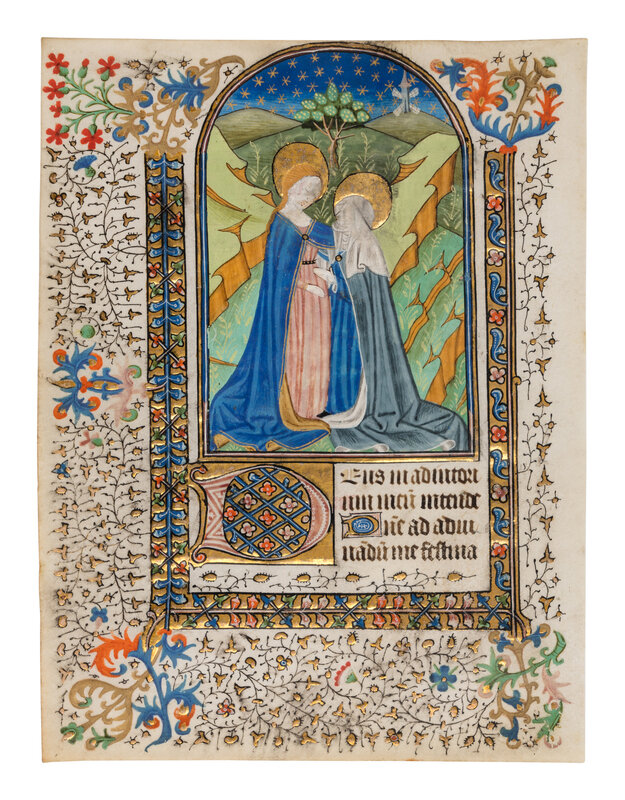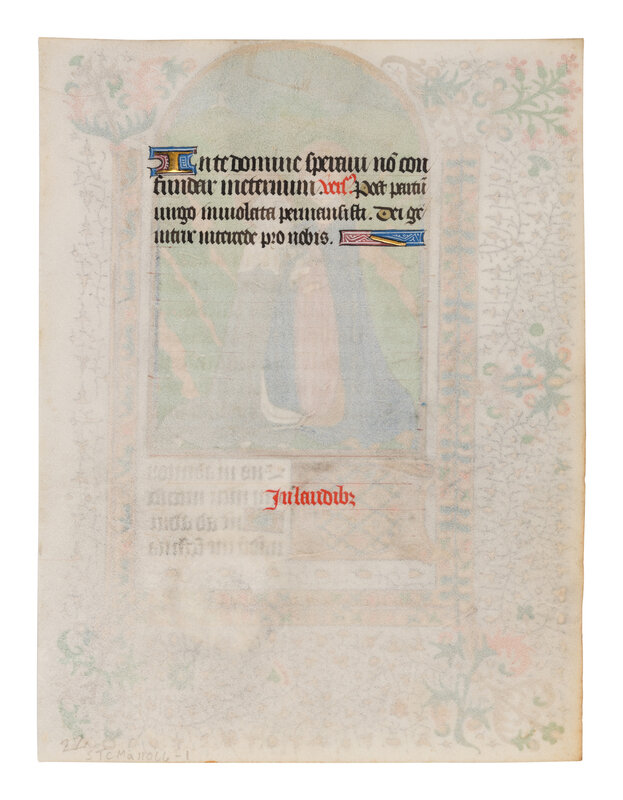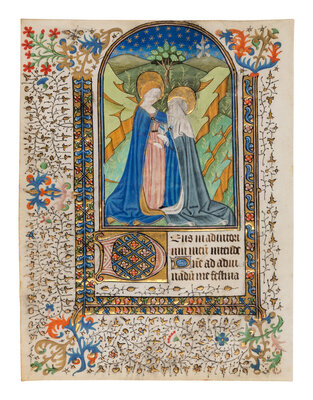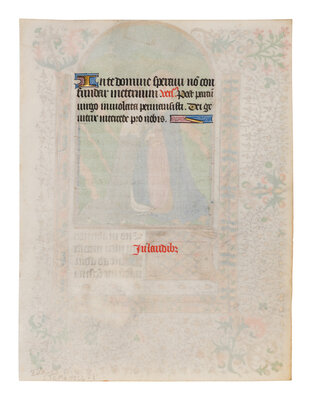Lot 39
MASTER OF SIR JOHN FASTOLF (active Paris, Rouen, and London, c. 1420-1460)
A leaf from a Book of Hours, use of Rouen, including a large miniature of the Visitation, in Latin, illuminated manuscript on parchment [France, Rouen, c. 1440-1450]
A leaf from a Book of Hours, use of Rouen, including a large miniature of the Visitation, in Latin, illuminated manuscript on parchment [France, Rouen, c. 1440-1450]
Sale 2033 - Western Manuscripts and Miniatures
Jun 27, 2024
10:00AM CT
Live / Chicago
Own a similar item?
Estimate
$3,000 -
4,000
Price Realized
$2,159
Sold prices are inclusive of Buyer’s Premium
Lot Description
MASTER OF SIR JOHN FASTOLF (active Paris, Rouen, and London, c. 1420-1460)
A leaf from a Book of Hours, use of Rouen, including a large miniature of the Visitation, in Latin, illuminated manuscript on parchment [France, Rouen, c. 1440-1450]
A leaf from a Book of Hours, use of Rouen, including a large miniature of the Visitation, in Latin, illuminated manuscript on parchment [France, Rouen, c. 1440-1450]
Fleeing Paris during the English occupation, this artist found a ready clientele of English patrons in Rouen, and the present miniature is a good example of his Rouennais style.
178 x 135. Single leaf, ruled in light brown for 16 lines (written space: 102 x 69 mm), written in brown ink in a late gothic bookhand, capitals touched with yellow, rubrics in red, one-line initials in burnished gold on red and blue ground with white tracery, line-fillers in same, ONE LARGE ARCH-TOPPED MINIATURE on the verso, framed with red, blue, and burnished gold, accompanied with a four-line illuminated initial in light red on burnished gold ground, in-filled with colored flowers, extending into a three-sided bar borders of colored flowers on burnished gold ground, accompanied with a full floral border of hairline stems with gold ivyleaves and five sprouts of colored acanthus (faces abraded, minor browning at edges, slight ink transfers in the border, else in good condition).
This leaf comes from a dismantled Book of Hours for the use of Rouen, of which it introduced the hour of Lauds for the Hours of the Virgin, as indicated by the rubric on the recto and the theme of the Visitation. The large miniature depicts Mary and Elizabeth embracing each other in the foreground of a rocky landscape, opening onto a windmill and a blue starry sky. Considering the condition of the sister leaves and the recent dismantlement of the manuscript, the faces of Mary and Elizabeth were most likely abraded through devotional kissing and rubbing by a patron or early owner who would have been pregnant or wished to become pregnant (on this practice, see Rudy 2023).
The illumination of this leaf and its parent manuscript can be securely attributed to the Master of Sir John Fastolf, an important illuminator named after a manuscript of Christine de Pizan commissioned by this English captain (Oxford, Bodleian Library, MS Laud. Misc. 570). Characteristic of his style are the ample volume of the figures, the landscape made of rocky cliffs, and the gold stars painted in the sky. The Master of Fastolf trained alongside the Bedford Master in Paris at the time of the English occupation of the city. He subsequently followed his English clientele in Rouen, before settling in London in the early 1450s. The layout of this leaf compares well to the Hours of Lady Margaret Beaufort (Cambridge, St. John’s College, MS N.24), which was illuminated in the 1440s. Both the model of the Visitation and its floral border rely on models similar to that of a Visitation, in another Book of Hours for the use of Rouen illuminated by the Fastolf Master in the early 1440s (Paris, BnF, Arsenal MS 575, f. 56v).
Provenance
(1) Maggs Bros, Catalogue 1407, 2007, no. 32 ; Maggs Bros, Catalogue 1423, 2008, no. 28.
(2) Private collection, USA.
Parent manuscript
The parent manuscript was a Book of Hours for the use of Rouen sold at Sotheby’s, London, 5 December 2006, lot 44, and subsequently dismantled. It consisted of 108 leaves, illuminated with six large miniatures including the present one as f. 40v, and was bound in an eighteenth-century calf binding. It already lacked six leaves with miniatures.
Sister leaves
Seven leaves, with the miniatures of the Annunciation, the Visitation (present leaf), the Nativity, the Annunciation to the Shepherds, David in Prayer, the Funeral Service, and a text leaf, were offered as individual lots by Maggs Bros in 2007, Catalogue 1407, nos. 27-32. Of all these miniatures, only the faces of the Visitation, and to a lesser extent that of Gabriel in the Annunciation, had been rubbed, which further supports the hypothesis of a devotional rubbing.
LITERATURE
Further literature, see François Avril et Nicole Reynaud, Les Manuscrits à peintures en France, 1440-1520, Paris, 1993, pp. 169-170; Gregory Clark, Art in a Time of War: the Master of Morgan 453 and Manuscript Illumination in Paris during the English Occupation (1419-1435), Toronto, 2016; Kathryn Rudy, Touching Parchment. How Medieval Users Rubbed, Handled, and Kissed their Manuscripts, Cambridge, 2023.
Freeman’s | Hindman thank Senior Consultant Sandra Hindman and Elliott Adam for their assistance in preparing this sale.
Condition Report
Contact Information



